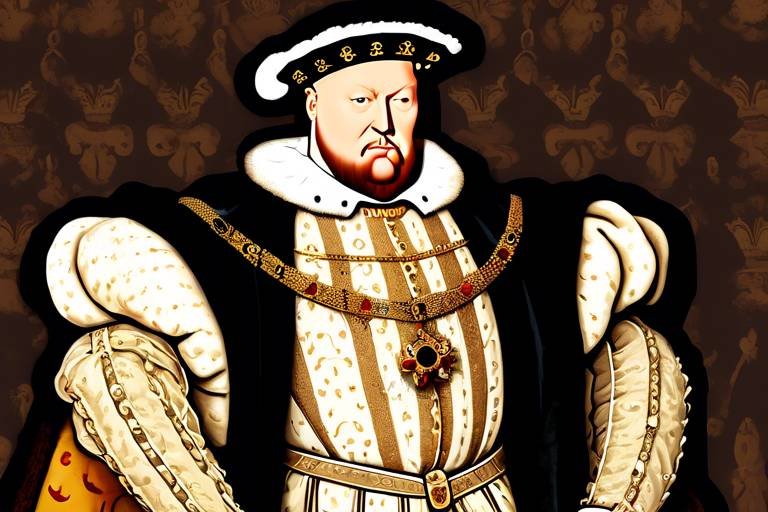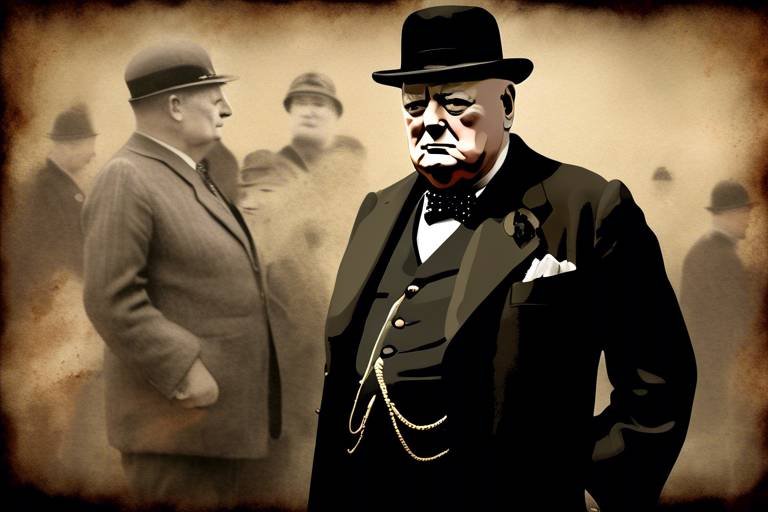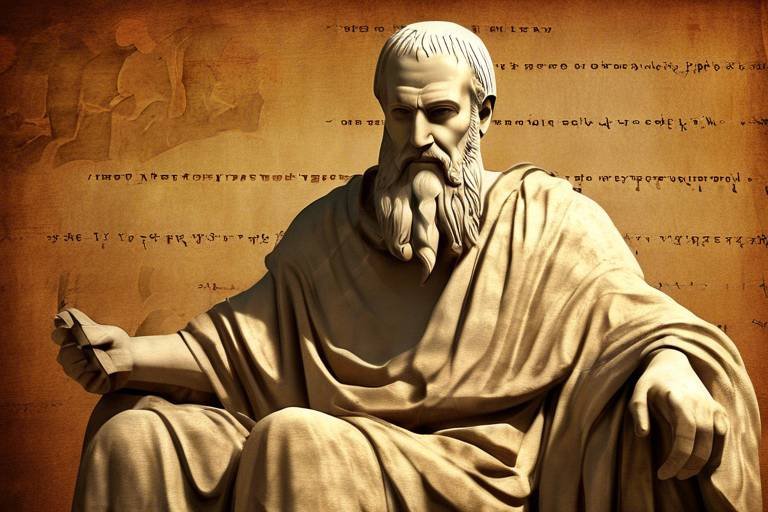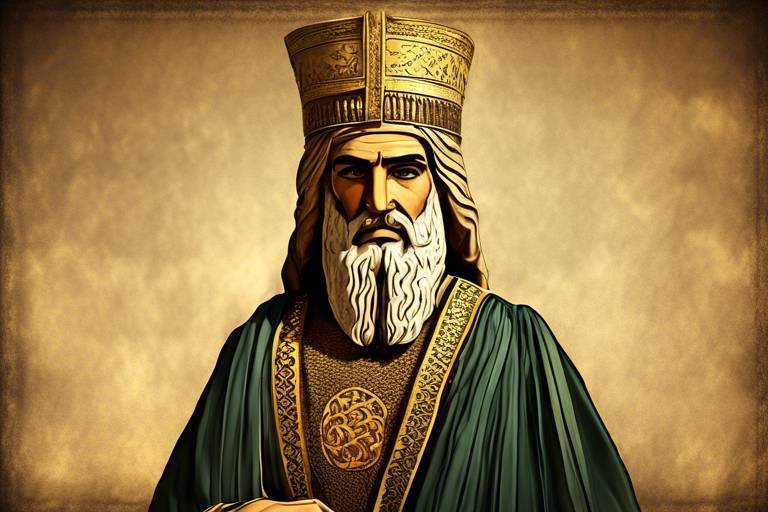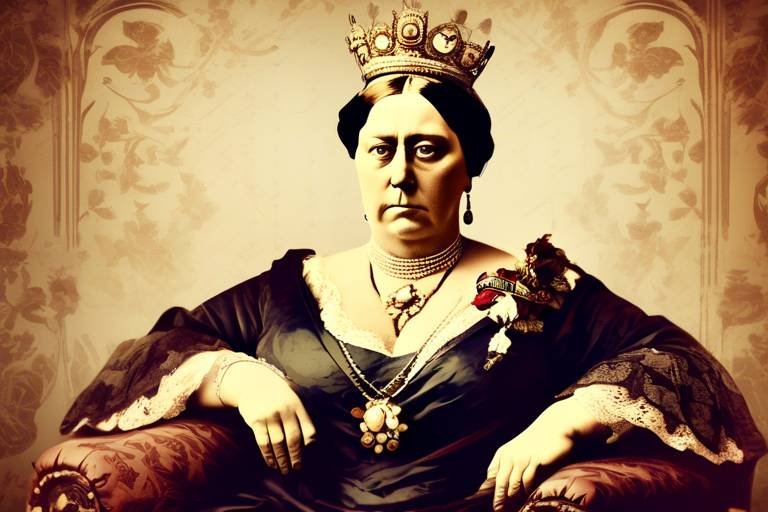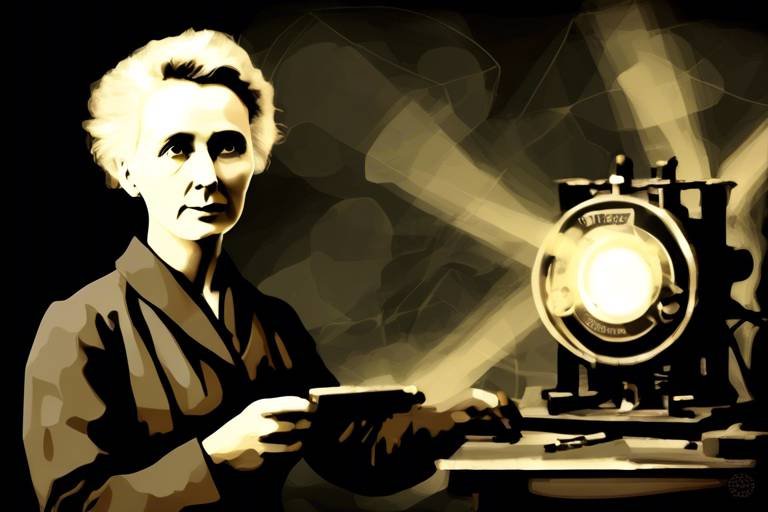Henry VIII: The Monarch Who Changed a Nation
Henry VIII, a name that resonates through the annals of English history like a thunderclap, a monarch whose reign was a tempest that reshaped the very fabric of a nation. His story is a tapestry woven with threads of ambition, love, betrayal, and power. Henry VIII stands as a towering figure, not just in stature but in the indelible mark he left on England, a nation forever altered by his actions.
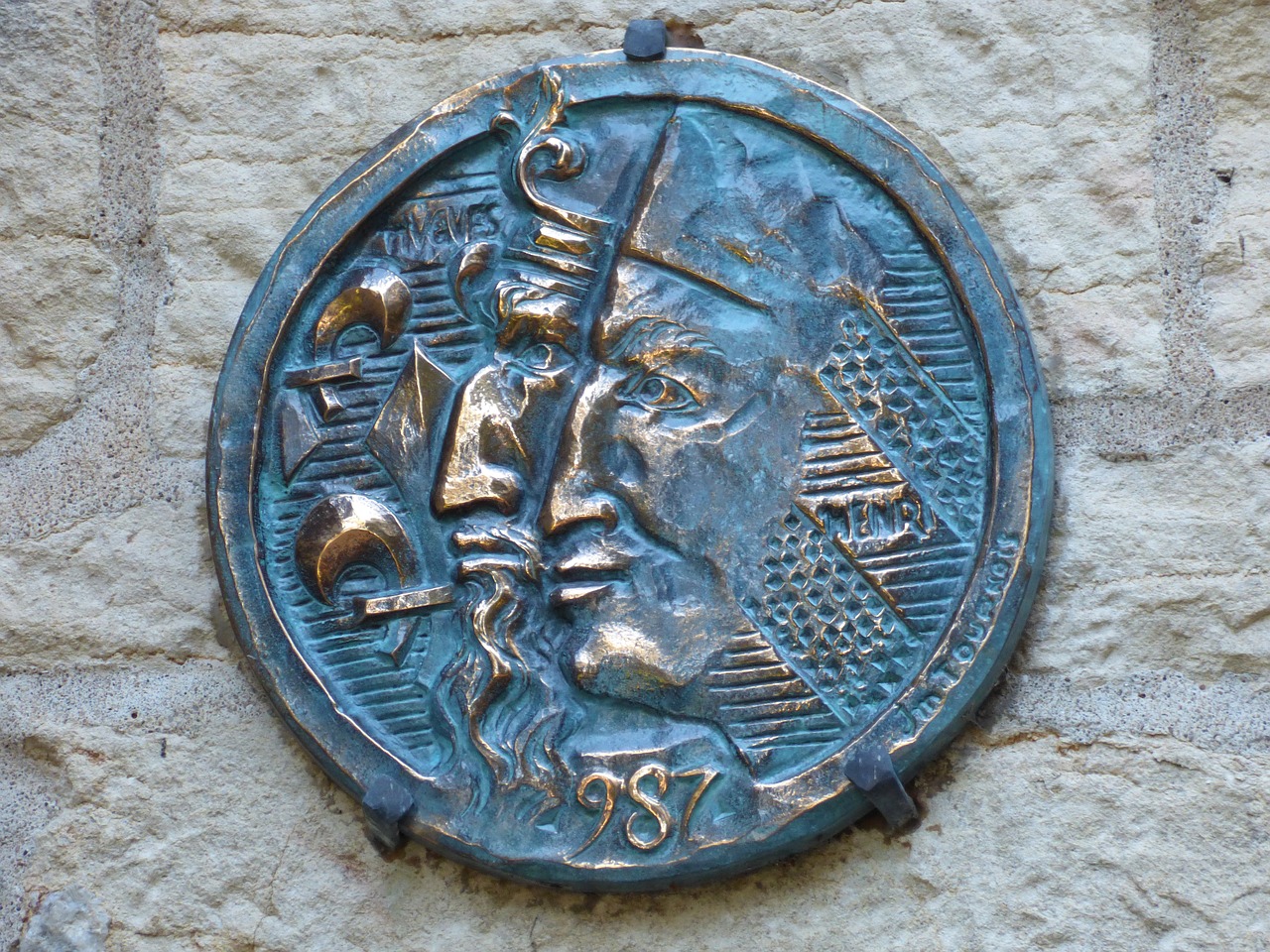
Early Life and Ascension to the Throne
Exploring the reign of Henry VIII, a transformative figure in English history known for his six marriages, break from the Catholic Church, and establishment of the Church of England, shaping the course of the nation.
Henry VIII's journey to the English throne is a tale of unexpected twists and turns. Born in 1491, he was not destined for kingship, being the second son of King Henry VII. However, fate had other plans, and at the tender age of 17, Henry VIII found himself thrust into the role of monarch following the death of his father. This sudden ascension marked the beginning of a reign that would leave an indelible mark on English history.
The union between Henry VIII and Catherine of Aragon was initially one of joy and promise. However, as years passed without the birth of a male heir, their happiness turned to despair. The pressure to produce a male successor weighed heavily on the royal couple, ultimately leading to a tumultuous period in their marriage.
The pivotal moment in Henry VIII's reign came with his desire to divorce Catherine of Aragon, a move that would shake the foundations of both his personal life and the country's religious landscape. This decision set in motion a chain of events that would culminate in England's break from the Catholic Church.
In a bold and unprecedented move, Henry VIII established the Church of England, severing ties with Rome and declaring himself the supreme head of the English church. This seismic shift in religious authority laid the groundwork for significant changes in the country's religious practices and beliefs.
The courtship and marriage of Henry VIII to Anne Boleyn were shrouded in controversy and intrigue. Their union not only altered the political landscape of England but also had far-reaching implications for the country's religious identity. The repercussions of their relationship would reverberate throughout history.
With the passing of the Act of Supremacy in 1534, Henry VIII solidified his power by officially establishing himself as the supreme head of the Church of England. This legislative move cemented his authority over religious matters and further separated England from the influence of the papacy.
Henry VIII's reign was marked by a series of bold domestic and foreign policies. From the dissolution of the monasteries to his military campaigns, he left an indelible imprint on the political and religious landscape of England. His reforms reshaped society and set the stage for future developments in governance and faith.
In the twilight years of his rule, Henry VIII faced challenges of declining health and a succession crisis. Despite these obstacles, his legacy endured, leaving a lasting impact on England in terms of religion, politics, and royal authority. The echoes of his reign continue to resonate through the annals of history.

Marriage to Catherine of Aragon
Marriage to Catherine of Aragon was a significant chapter in the life of Henry VIII, marking the beginning of his matrimonial journey and ultimately setting the stage for the English Reformation. Catherine, a Spanish princess, was initially wed to Henry's older brother, Arthur, who passed away shortly after their marriage. This unexpected turn of events led to Henry marrying Catherine, despite concerns about the validity of the union due to her previous marriage to his brother.
The early years of Henry and Catherine's marriage were filled with joy and companionship. Catherine was a devoted wife and queen, supporting Henry in his endeavors and playing an active role in court life. However, as time passed, the lack of a male heir became a pressing issue for the couple, leading to tensions and anxieties within their relationship.
Despite Catherine giving birth to several children, including a daughter who survived infancy, the absence of a male heir weighed heavily on Henry. This situation sparked a series of events that would ultimately alter the course of English history, as Henry sought an annulment of his marriage to Catherine in pursuit of a male successor.
The failure to secure a male heir with Catherine of Aragon prompted Henry VIII to question the validity of their marriage, citing biblical prohibitions against marrying a brother's widow. This dilemma, known as "The Great Matter," set the stage for Henry's break from the Catholic Church and his quest for a divorce, a decision that would have far-reaching consequences for England and the monarchy.
Henry's determination to obtain an annulment from Catherine of Aragon led to a protracted legal and theological battle with the Pope and the Catholic Church. Despite initial resistance, Henry's desire to marry Anne Boleyn and secure a male heir fueled his resolve to sever ties with Rome and establish his own religious authority in England.
The controversy surrounding Henry's divorce from Catherine of Aragon and his subsequent marriage to Anne Boleyn reverberated throughout Europe, sparking debates on marriage, religion, and royal power. This pivotal moment in history marked the beginning of a new era for England, one shaped by the personal desires and political ambitions of a monarch determined to secure his legacy.

The Great Matter: Divorce from Catherine of Aragon
Henry VIII's desire for a male heir led to a tumultuous period in his reign, famously known as "The Great Matter." His marriage to Catherine of Aragon, initially celebrated, soon faced challenges as Catherine failed to provide a male successor. Henry believed this lack of a male heir was a sign of divine disapproval, fueling his urgency to secure a divorce.
The inability to annul his marriage to Catherine of Aragon through traditional means prompted Henry to seek a radical solution. His quest for a divorce led to a direct confrontation with the Catholic Church, as he sought to break away from its authority and establish his own supremacy in matters of marriage and religion.
Despite facing strong opposition, Henry VIII was determined to obtain the divorce he believed necessary to secure the future of the Tudor dynasty. This pivotal event not only marked the beginning of the English Reformation but also set the stage for the profound changes that would reshape the religious landscape of England.
As Henry pursued his divorce from Catherine of Aragon, the political and religious implications reverberated throughout the nation. The Great Matter was not merely a personal struggle for Henry's marital happiness but a catalyst for the seismic shifts that would define his legacy as a monarch willing to challenge established norms and institutions.

The Formation of the Church of England
Henry VIII's decision to break away from the Catholic Church and establish the Church of England marked a defining moment in English history. This bold move not only reshaped the religious landscape of the nation but also solidified Henry's power and authority as the monarch. By asserting himself as the supreme head of the English church, Henry VIII set in motion a series of events that would have far-reaching consequences for centuries to come.
Upon severing ties with Rome, Henry VIII embarked on a mission to create a church that aligned with his own interests and beliefs. The formation of the Church of England was not simply a religious matter but a strategic political move that allowed Henry to consolidate his control over both spiritual and secular affairs. This shift in religious allegiance positioned Henry as a central figure in English religious life, with the power to dictate doctrine and practice.
To establish the Church of England, Henry VIII needed to navigate complex theological and political challenges. By breaking away from the authority of the Pope and Rome, Henry set the stage for a new era of religious independence in England. This move was met with both support and opposition, as it challenged centuries-old traditions and sparked debates about the nature of religious authority.
The creation of the Church of England also had profound implications for the English people. It introduced a new religious identity that was distinct from Catholicism, emphasizing the monarch's role as the spiritual leader of the nation. This shift in religious structure not only transformed the way people worshiped but also influenced the cultural and social fabric of English society.

Marriage to Anne Boleyn
Henry VIII's marriage to Anne Boleyn marked a significant turning point in English history, causing shockwaves across the nation. Their relationship was shrouded in controversy, starting with their secret courtship that led to a tumultuous marriage. Anne Boleyn's influence on Henry VIII's reign cannot be understated, as she played a crucial role in the King's decision to break away from the Catholic Church and establish the Church of England.
The union between Henry and Anne was not only a personal matter but a political and religious one as well. Their marriage had profound implications for English politics, triggering a series of events that would reshape the religious landscape of the country. Anne Boleyn's position as Queen consort brought about both admiration and animosity, with factions forming in support or opposition to the King's new queen.
Despite the initial euphoria surrounding their marriage, Anne Boleyn's inability to provide Henry VIII with a male heir proved to be a pivotal factor in their tumultuous relationship. The pressure to produce a male successor weighed heavily on Anne, leading to strained relations with the King and the court. As tensions mounted, Anne's influence waned, ultimately culminating in her tragic downfall.
Henry VIII's decision to marry Anne Boleyn had far-reaching consequences, not only on his personal life but on the political and religious landscape of England. The annulment of his marriage to Catherine of Aragon and subsequent marriage to Anne set in motion a chain of events that would forever alter the course of English history. The repercussions of Henry's union with Anne Boleyn reverberated throughout the kingdom, leaving a lasting impact on the monarchy and the Church.

The Act of Supremacy
The Act of Supremacy was a defining moment in the reign of Henry VIII, solidifying his authority over the Church of England and marking a significant break from the Catholic Church. In 1534, Parliament passed the Act of Supremacy, declaring Henry VIII as the supreme head of the Church of England. This legislation not only granted Henry unprecedented power over religious matters but also established the English monarch as the ultimate authority within the realm of spirituality.
With the Act of Supremacy, Henry VIII effectively severed ties with the papacy in Rome, asserting his independence from the authority of the Pope. This move was not only a political maneuver but also a religious one, as Henry sought to consolidate his control over both the state and the church. By assuming the title of the supreme head of the Church of England, Henry positioned himself as the ultimate arbiter of religious doctrine and practice within his realm.
The Act of Supremacy also had profound implications for the English religious landscape. It paved the way for the dissolution of the monasteries and the redistribution of their wealth, further consolidating Henry's power and wealth. Additionally, it set the stage for the English Reformation, as the Church of England began to diverge from Roman Catholic teachings and practices under Henry's leadership.
One of the key aspects of the Act of Supremacy was the requirement for individuals to swear an oath recognizing Henry VIII as the supreme head of the Church of England. Those who refused to do so faced severe consequences, including imprisonment and even death. This enforcement of loyalty to the monarch's religious authority underscored the importance that Henry placed on maintaining control over the church and ensuring compliance with his directives.

Political and Religious Policies
Henry VIII's reign was marked by significant political and religious policies that reshaped England's landscape. One of his most notable actions was the dissolution of the monasteries, a move that not only bolstered the royal treasury but also aimed to diminish the power of the Catholic Church in England. By seizing the wealth and lands of monastic institutions, Henry VIII sought to assert his authority and weaken any potential opposition to his rule. This policy sparked widespread changes in the religious and social fabric of the country, leading to the redistribution of resources and the establishment of new power structures.
In addition to his domestic policies, Henry VIII was also deeply involved in foreign affairs, engaging in military campaigns to expand England's influence on the international stage. His pursuit of territorial gains and strategic alliances shaped England's position in Europe and solidified his reputation as a formidable monarch. Through a combination of diplomacy and military force, Henry VIII sought to assert his authority and secure his place among the leading powers of the time.
Furthermore, Henry VIII's religious reforms had a profound impact on English society, sparking debates and divisions that reverberated for centuries to come. By breaking away from the Catholic Church and establishing the Church of England, Henry VIII initiated a religious revolution that challenged the traditional authority of Rome and paved the way for a distinct English religious identity. His assertion of supremacy as the head of the English church marked a decisive break from centuries of papal influence and set the stage for the development of Protestantism in England.
Overall, Henry VIII's political and religious policies were instrumental in shaping the course of English history, leaving a lasting legacy that continues to be studied and debated to this day.

Late Reign and Legacy
As Henry VIII's reign progressed into its later years, the once formidable monarch faced a series of challenges that would ultimately define his legacy. Struggling with deteriorating health and the consequences of his tumultuous personal life, Henry found himself embroiled in a succession crisis that would shape the future of England.
Amidst the backdrop of political intrigue and power struggles, Henry VIII's legacy was a complex tapestry of achievements and controversies. His ambitious military campaigns and dissolution of the monasteries left a lasting impact on the English landscape, reshaping the country's religious and political structures.
Despite his significant contributions to the English Reformation and the establishment of the Church of England, Henry VIII's later years were marked by a sense of uncertainty and instability. The king's desperate quest for a male heir, coupled with his multiple marriages and ruthless pursuit of power, created a legacy that was as divisive as it was influential.
As Henry VIII's reign drew to a close, the weight of his decisions and actions bore heavily on the nation he had sought to transform. His legacy as a monarch who wielded absolute authority, shaped by personal desires and political expediency, would endure long after his passing, leaving a legacy that continues to be debated and analyzed to this day.
Frequently Asked Questions
- 1. Who were Henry VIII's six wives?
Henry VIII had six wives in total. Their names, in order of marriage, were Catherine of Aragon, Anne Boleyn, Jane Seymour, Anne of Cleves, Catherine Howard, and Catherine Parr.
- 2. What was the Great Matter and its significance?
The Great Matter refers to Henry VIII's desire to annul his marriage to Catherine of Aragon, which led to his break from the Catholic Church. This event was significant as it sparked the English Reformation and ultimately resulted in the establishment of the Church of England.
- 3. How did Henry VIII assert his supremacy over the Church of England?
Henry VIII asserted his supremacy over the Church of England through the Act of Supremacy passed by Parliament in 1534. This act declared him as the supreme head of the Church of England, granting him full control over religious matters within the country.
- 4. What were some of Henry VIII's key political and religious policies?
Henry VIII implemented various policies during his reign, including the dissolution of the monasteries, military campaigns, and religious reforms that aimed to consolidate his power and authority. These policies had a profound impact on English society at the time.
- 5. What is Henry VIII's legacy on England?
Henry VIII's legacy on England is multifaceted, encompassing changes in religion, politics, and royal authority. His actions during his reign shaped the course of English history and left a lasting impact that can still be seen today.

